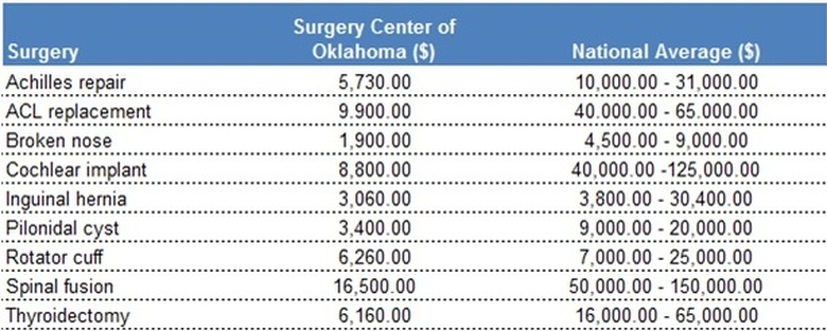Here's an excerpt:
'...physicians are not necessarily the principal beneficiaries of healthcare spending. The bulk of medical procedure payments go to hospitals and device manufactures. For example, in California, Medicare pays on average $18,000 for a total hip replacement – $16,336 to the hospital and $1,446 to the surgeon. This reimbursement disparity is certainly not limited to California, and is representative of a broader trend on a national level.' Based on available figures the majority of the costs patients pay goes to administrative costs. In this case above, the doctor's compensation is roughly just 8% of the $18,000 cost of the total hip replacement. Approximately 92% of the $18,000 went to the hospital and the device manufacturer(s). A 2008 New York Times article had this to say about the extra spending: 'One thing Americans do buy with this extra spending is an administrative overhead load that is huge by international standards. The McKinsey Global Institute estimated that excess spending on “health administration and insurance” accounted for as much as 21 percent of the estimated total excess spending ($477 billion in 2003). Brought forward, that 21 percent of excess spending on administration would amount to about $120 billion in 2006 and about $150 billion in 2008.' Money spent on hospital administrative and 3rd party costs drives up the price for healthcare far more than a doctor's compensation. This can be an issue for patients as care and service can be delayed while paperwork/fees goes through different departments of the hospital's administrative process. Can at least some of the bloated administrative costs be reduced? What would happen if a doctor was able to deal directly with the patient without bureaucracy and 3rd parties getting in the way and driving up costs? Perhaps the best example of what can be done is happening at the Surgery Center of Oklahoma. Surgery Center of Oklahoma Price ComparisonThe founding doctors, Dr. Keith Smith and Dr. Steven Lantier, own their facility. They do not work for a bureaucratic hospital. They tell patients their prices upfront so you can compare them to hospital surgeons fees. When asked how the Surgery Center of Oklahoma can offer these lower prices to patients, Dr. Keith Smith has mentioned in several interviews that he doesn't have to waste his and the patient's time dealing with hospital administration actions and insurance companies that raises costs and interferes with the care provided to his patients. People come to the Surgery Center of Oklahoma from all over the world for medical services, patients even come from Canada (the country that's supposed to have a good reputation for healthcare). By working with the patient directly and not having to deal with expensive hospital overhead costs, this surgery center can just offer the costs of the service which translates to steep price discounts for the patient. According to Dr. Keith Smith, who helped start the Surgery Center of Oklahoma back in 1997, he gets letters every week from patients who are happy to tell him that they had their local hospital lower their original price and match the Surgery Center's price for medical service. Hospitals are forced to either reflect a more honest pricing system or lose their patients to facilities like the Surgery Center of Oklahoma. While politicians argue and blame each other for rising healthcare prices. The Surgery Center of Oklahoma is successfully providing much needed high quality medical care while also eliminating the bureaucracy of 3rd parties. They have shown how healthcare costs can be reduced by having a system of transparent pricing. Allowing patients to see where their money is going when they pay for medical services. Price transparency is a rare occurrence in our current healthcare model system. Many times even doctors aren't aware of medical costs, they just tell their patients that it will be ok because their insurance covers the prescription or operation. With price transparency and direct patient/doctor communication, patients have a better understanding of how much of their hard earned money is actually going towards their medical care as opposed to wasting away deep into the hospital administrative process. The Surgical Center of Oklahoma shows people that there is a better option other than waiting for politicians and bureaucrats to solve the problem. HealthyAssets.org will provide information on how people are finding ways to reduce their healthcare costs while also receiving high quality care. Videos related to this article
Dr. Keith Smith Explains How & Why the Surgery Center of Oklahoma can offer High Quality Low Cost Care
Billing Terms Can Increase Your Hospital Costs
A theme mentioned in this article is for patients to have a direct relationship with their doctor so they can have more control of decisions regarding their care. I should still mention that I do believe that patients should do as much research as possible when it comes to the opinions and statements made by their doctor.
Whatever situation you may go through, search online to see how other people have received care for the same issue and how successful they were at restoring their health. See what options are available and which option you feel most comfortable with and then explain your thoughts to your doctor. This way there is a true meeting of the minds as opposed to just accepting what your doctor has to say. This is the reason for getting a second opinion but now with information all over the internet you can research even more opinions and search for the evidence that backs up the claims of other people. Your health is too important for just one person to decide what must be done for you. To your health -- Ricky Moore. |
BlogsObserving the Cause/Effect cycle of economic systems. Archives
November 2020
Categories |


 RSS Feed
RSS Feed